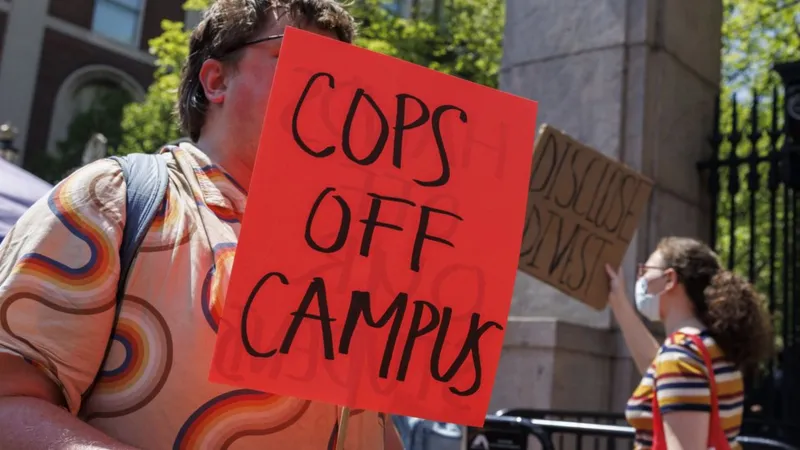Columbia University community 'shattered' after police raid
Police and private security throng every entrance but one. Steel barriers line the streets. Students pack up belongings in their cars and leave for home - classes are cancelled, and exam plans are up in the air.

Everywhere there is gloom, and uncertainty about what happens next at Columbia University in New York City.
Students told the BBC that the university's decision to call in police to clear a Gaza protest late on Tuesday, leading to a raid on the occupied Hamilton Hall and more than 100 arrests, has left the college community shattered.
The university president, Minouche Shafik, said that it was with great regret that she had ordered the police raid against students and others she said had infiltrated the protest. It would "take time to heal", she added in a message in the operation's aftermath.
For students of this prestigious school in Manhattan, how long is unclear.
"It definitely feels like things are scattered," said Anna Oakes, a graduate journalism student at Columbia University who covered the removal of protesters from Hamilton Hall on Tuesday evening. "There's this feeling of scramble in the aftermath."
After a night of chaos and confrontation, the clearest reminder of the protests on Wednesday morning was water-logged flyers littering streets alongside the campus perimeter. One said that protest organisers "will not stop. We will not rest".
Students who remained said they were in the dark about plans for their finals and even whether dining services would be brought back fully.
While others speed off in cars packed with possessions, Will Parkinson, a 20-year-old environmental studies student, described his feeling: "Weird limbo."
"We're not sure what to do," he said, and recounted how he watched from a friend's dorm window as police stormed Hamilton Hall.
He had been barred from leaving the building during the raid, which meant he was unable to get home and finish a term paper.
Mr Parkinson said Columbia had given students money to spend at nearby restaurants because they had to limit staff who would normally operate the university's cafeterias.
He had left campus to eat, and was not sure when he would eventually write that paper.
Others continued to peacefully protest, walking near the new steel barriers, holding slogans including "Cops off campus" and "Student power v Israel power".
Members of the faculty, whose access to campus and offices is now largely denied, said they did not know how they were expected to conclude the semester.
"I have students who can't get to their work study to pay for school, I have faculty members with papers they need to grade locked in their offices, I have 16 instructors looking to me for guidance on how to support students through finals and the end of the semester," said Joseph Howley, a classics professor who has worked with the student protesters.
"So it has completely upended everything we do."
Unable to address those academic obligations, Prof Howley led dozens of students and faculty members in a protest outside the one campus entrance left unobstructed on Wednesday afternoon.
He and others said that the university administration had lost their trust by bringing police on to campus, and that they shouted "shame" in unison when Dr Shafik's name was mentioned.
One unidentified speaker at the protest said she was at Hamilton Hall when police "ambushed us. We were tackled and beaten, and my hands were handcuffed so tightly that even lifting my pinky caused extreme harm and excruciating pain".
The NYPD denied that it was unnecessarily aggressive, and the administration has defended its decision to bring in police - who will remain on campus until 17 May.
Meghnad Bose, a 31-year-old journalism graduate student at Columbia University, witnessed the NYPD raid on Tuesday night and said police acted "rough and aggressive" with the protesters.
While 109 people at Columbia University were arrested when police stormed the school to quash the pro-Palestinian protest, police said at a Wednesday press conference that they arrested another 173 people at a similar sit-in at the City College of New York later in the evening.
Police Commissioner Edward Caban said officers intervened because "public safety was a real concern... the NYPD was called in to do their job".
A 19-year-old physics student named Kevin - he declined to give his last name - said it was "difficult to be proud of being a Columbia student" after the police raid, which had left him deeply frustrated.
He spoke while piling bags full of clothes into his parents' car just outside the campus gates, and said he was unsure when he would return.
-bbc







